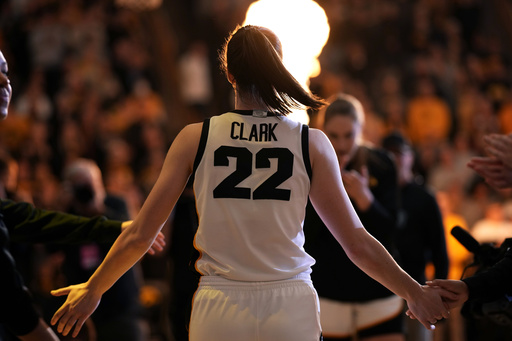
Caitlin Clark has significantly elevated the visibility of women’s basketball, making a profound impact in both collegiate and professional arenas. Recently, she was honored as the AP Female Athlete of the Year, recognizing her contributions both on and off the court.
Clark’s remarkable journey included leading the University of Iowa to the national championship game, after which she was the anticipated first overall pick in the WNBA draft. She quickly made her mark in the league, clinching rookie of the year honors. Her performances not only drew enthusiastic crowds filling arenas but also attracted millions of viewers on television, thereby shining a spotlight on women’s sports as a whole.
The award was determined by a vote from a panel of 74 sports journalists affiliated with the Associated Press. Clark received 35 votes, beating out Olympic gymnast Simone Biles, who garnered 25 votes, while boxer Imane Khelif secured four.
Since the inception of this award in 1931, only three other women’s basketball players have received this honor: Sheryl Swoopes in 1993, Rebecca Lobo in 1995, and Candace Parker in 2008 and 2021. In response to her recognition, Clark remarked, “I grew up a fan of Candace Parker and those who paved the way for me. Being honored in this manner is incredibly special, and I am grateful.” She also emphasized the recent surge in recognition for women’s basketball.
On the previous day, Shohei Ohtani was named the AP Male Athlete of the Year for the third occasion. Clark achieved a historic milestone by breaking the NCAA Division I career scoring record, amassing a total of 3,951 points during her tenure, and leading Iowa to its second consecutive national championship game. After her team’s loss to South Carolina, the Gamecocks head coach, Dawn Staley, publicly thanked Clark for her role in uplifting the sport.
Despite her accomplishments and the attention she has garnered, Clark continues to face criticism and online hostility, often becoming a contentious figure in discussions about women’s basketball. Nevertheless, she has distanced herself from negative dialogues surrounding the sport.
Rebecca Lobo expressed admiration for how the 22-year-old has managed the intense scrutiny and high expectations that have come her way. “She has navigated this spotlight almost flawlessly, avoiding major missteps while under constant observation,” Lobo stated. “Her ability to consistently say and do the right things in such a challenging environment is commendable.”
As Clark reflects upon her successful year amidst the chaos that comes with it, she acknowledges those who supported her. “I am very thankful for the people I shared these moments with,” she said. “Just a year ago, I was still starting my senior year in college, and it’s remarkable how quickly things can change. Now, I can appreciate how extraordinary this past season was.”
Her popularity translated into significant sellouts for both home and away games, and this momentum seamlessly transitioned into the professional realm. The No. 22 jersey that Clark wore became a common sight during her rookie season and is set to be retired at Iowa.
Indiana Pacers guard Tyrese Haliburton noted the tremendous fan support surrounding Clark, highlighting her unprecedented popularity. “It’s remarkable to witness her influence, as she has achieved a level of fame that extends beyond just women’s sports,” he remarked. “She manages her popularity with such poise, making it truly fascinating to observe.”
Clark enjoys interacting with her fans, often dedicating time to sign autographs before and after games. “It remains a fun experience for me,” she shared. “Those brief moments can significantly impact a young fan’s life, and I cherish that connection.”
After a slow start in the WNBA, Clark eventually hit her stride, setting a record with 19 assists in a single game and amassing 337 assists throughout the season. Known for her long-range shooting, she quickly became the fastest player to hit 100 three-pointers, helping the Indiana Fever reach the playoffs for the first time since 2016.
Reflecting on the growth of women’s basketball, Lobo, who was present during pivotal moments of the sport, noted that Clark represents a new era. “Her influence has drawn attention and viewership to women’s basketball that it has never experienced before,” she stated. “This is a significant leap forward, unlike anything I’ve witnessed.”
Clark’s involvement in broadcasts has also resulted in record-breaking viewership numbers:
– WNBA television ratings surged by 300%, with viewership records set across various networks during Fever games.
– The NCAA women’s championship outperformed the men’s equivalent for the first time in its history, attracting 18.9 million viewers.
– The 2024 WNBA draft achieved historic viewership with 2.4 million tuning in.
Clark credits her fellow women athletes for the rising popularity of women’s sports, consistently using inclusive language when discussing these achievements. “It’s mind-blowing to realize the impact of 18 million viewers,” she stated, “especially when compared to traditional sporting events. We outdid the men’s Final Four.”

